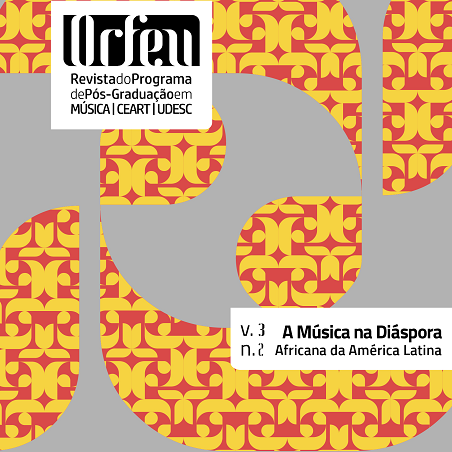Música negra en los Andes colombianos. Historia y política de las sonoridades Afro en Girardota-Antioquia
DOI:
https://doi.org/10.5965/2525530403022018010Keywords:
afro colombian music, ethnicity, Girardota, AntioquiaAbstract
This paper aims to offer a reflection on the artistic manifestations of an Afro-descendant community in the Colombian department of Antioquia. From an interdisciplinary fieldwork, we explore with special attention the string music that has made visible in the regional, national and international scope, the interpreters and composers of this community. The contribution of the research consigned in this text is to expose the preponderant role of these manifestations in the ethnic affirmation of the group, where unlike other Afro populations of the continent, there is no musical tradition of percussion. This research concludes that the studied group affirms its identity from the interpretation of music and other practices that are associated with an Iberian origin, but that in the local context have been appropriate and incorporated as part of its legacy and tradition.
Downloads
References
Bakhtin, Mikhail. (1986). “The problem of speech genres”. En Speech genres and other late essays, editado por Caryl Emerson y Michael Holquist, 60-102. Austin: University of Texas Press.
Blacking, John. 1967. How musical is man? Seattle: University of Washington Press.
Blanco Arboleda, Darío. 2009. “De melancólicos a rumberos… de los Andes a la Costa: la identidad colombiana y la música caribeña”. Boletín de Antropología Universidad de Antioquia 23 (40): 102-128.
Castillo, Luis Carlos. 2007. Etnicidad y nación: el desafío de la diversidad en Colombia. Cali: Universidad del Valle.
Corantioquia (Corporación Autónoma Regional del Centro de Antioquia). 2000. Agenda ambiental urbana: municipio de Girardota. Medellín: Corantioquia.
Corantioquia (Corporación Autónoma Regional del Centro de Antioquia). 2011a. El sainete está corrido: estudio para la postulación como patrimonio cultural inmaterial departamental. Medellín: Corantioquia.
Corantioquia (Corporación Autónoma Regional del Centro de Antioquia). 2011b. Hijos de la rima: una voz bien hablada cuenta la historia del sainete del Consejo Comunitario Afrodescendiente de la vereda de San Andrés. Medellín: Corantioquia.
Correa Bustamante, Carlos Mario. 2002. “De Hatogrande a Girardota”. Tesis de grado, Universidad de Antioquia, Medellín, Colombia.
Domínguez, María Eugenia. 2011. “Versiones, apropiación e intermusicalidad en el Río de la Plata”. Revista Antropoligia em Primeira Mão 126: 3-19.
El balcón. 2014. Identidad y memoria: rastros de la tradición oral en la vereda de San Andrés. Medellín: El balcón. http://otrasletrasvirtual.blogspot.com.co/2014/09/identidad-y-memoria-rastros-alegres-de.html
Foronda, Arnobia. 2002. Tradición oral sobre la historia de la vereda de San Andrés Girardota (Antioquia). Girardota, Colombia: Consejo Comunitario de la vereda de San Andrés/Corantioquia.
Guattari, Félix y Suely Rolnik. 2013. Micropolítica: cartografías del deseo. Buenos Aires: Tinta Limón.
Guerrero, Juliana. 2012. “El género musical en la música popular: algunos problemas para su caracterización”. Trans: Revista Transcultural de Música 16: 1-22. http://www.redalyc.org/pdf/822/82224815008.pdf
Hernández Salgar, Óscar Andrés. 2014. “Los mitos de la música nacional: poder y emoción en las músicas populares colombianas 1930-1960”. Tesis doctoral, Pontificia Universidad Javeriana, Bogotá, Colombia.
López, Gustavo, Héctor Rendón y Fred Palacio. 2006. Atardecer en San Andrés: música tradicional de Girardota, Antioquia, vereda de San Andrés. Medellín: Universidad de Antioquia.
Menezes Bastos, Rafael José de. 2013. A festa da Jaguatirica: uma partitura critico-interpretativa. Florianópolis: Universidade Federal de Santa Catarina.
Merriam, Alan. 1964. The Anthropology of Music. Evanston: Northwestern University Press.
Muñoz, Paloma. 2012. “‘Violines de negros’ del valle interandino del Cauca”. Revista A Contratiempo 18: 34-42.
Ochoa, Ana María. 2003. Músicas locales en tiempos de globalización. Buenos Aires: Norma.
Palacio Villa, Andrés. 2014. Con aire de campo. Documental. Medellín: Universidad de Antioquia. https://www.youtube.com/watch?v=yn0a8sUSj7Y
Piedade, Acácio Tadeu. 2007. “Expressão e sentido na música brasileira: retórica e análise musical”. Revista eletrônica de musicologia 11: 1-15. http://www.rem.ufpr.br/_REM/REMv11/11/11-piedade-retorica.html
Pita Pico, Roger. 2014. La manumisión de esclavos en el proceso de independencia de Colombia: realidades promesas y desilusiones. Bogotá: Juan Luis López.
Shepherd, Jhon. 1991. Music as Social Text. Cambridge: Polity Press.
Smithsonian Folklife Festival. 2011. “Day Six in Photos”, acceso el 10 de octubre de 2017, https://festival.si.edu/blog/2011/todays-ten-photos-from-77
Wade, Peter. 2002. Música, raza y nación: música tropical en Colombia. Bogotá: Vicepresidencia de la República de Colombia.
Wainer, Jean. 2000. La mundialización de la cultura. Barcelona: Gedisa.
Wabgou, Maguemati. 2012. “Herencia negroafricana en Colombia”. Apuntes sobre África y Medio Oriente 9: 99-115.
Downloads
Published
How to Cite
Issue
Section
License
Copyright (c) 2018 ORFEU

This work is licensed under a Creative Commons Attribution 4.0 International License.
Authors who submit their manuscripts to be published in this journal agree to the following terms:
1. Authors retain the copyright and grant to the journal the right of first publication, whilst simultaneously permitting their work to be licensed under the Creative Commons License Attribution, which allows the sharing of work with recognition of the authorship and initial publication in this journal.
2. Contributions in this journal are open access; this means they are based in free use, and non-commercial applications.






